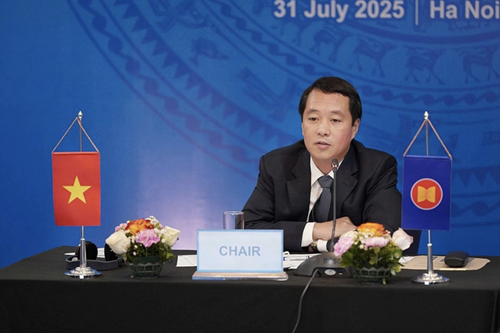Chairing the meeting, Bui Chinh Nghia, Deputy Director of the Forestry and Forest Protection Department and Director of the CITES Vietnam Management Authority, shared that regional solidarity and cooperation are the key factor for the effective implementation of wildlife protection regulations.
    |
 |
|
Bui Chinh Nghia, Deputy Director of the Forestry and Forest Protection Department and Director of the CITES Vietnam Management Authority, speaks at the meeting. |
No countries can singlehandedly address this issue. Only through sustainable cooperation, innovative approaches, and collective action can biodiversity be safeguarded for the present and future generations, he remarked.
The meeting of the AWG CITES and WE is held annually on a rotational basis among the 10 ASEAN countries. This year’s event took place online, gathering representatives from the ASEAN Secretariat, the 10 ASEAN member states, and relevant international and non-governmental organizations. Timor-Leste participated as an observer.
It aimed to review and assess the implementation of recommendations, decisions, and CITES enforcement related to ASEAN countries. The event also examined national reports on the enforcement of laws concerning endangered wild flora and fauna, developed ASEAN joint initiatives, and considered, discussed, and agreed on proposals regarding the CITES Appendices and policies to be reviewed at the 20th meeting of the Conference of the Parties to CITES (CITES CoP20).
Over the past year, ASEAN members have continued to make significant progress in advancing their shared commitment to combatting illegal wildlife trade, despite ongoing challenges related to law enforcement and transnational crime.
As one of the regions with the highest biodiversity in the world, Southeast Asia is both a focal point for conservation efforts and a hotspot for illegal wildlife trade. Recognizing this role, ASEAN has continuously strengthened law enforcement mechanisms, promoted cross-border cooperation, and supported the legal and sustainable trade of wildlife.
Vietnam has made significant progress in enhancing enforcement capacity and inter-sectoral coordination through information sharing, the adoption of digital monitoring tools, and the improvement of its legal framework. At the regional level, it has actively participated in ASEAN-led mechanisms and contributes to the implementation of the ASEAN Cooperation Action Plan under CITES and Wildlife Enforcement for the 2021–2025 period.
Source: VNA